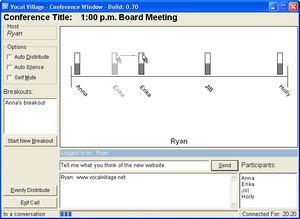My colleague StÈfan Sinclair is organizing a Text Analysis Summit which promises to be great retreat from buzyness.
Video Preservation
Ever wondered how to identify different video formats or what to do to preserve old tapes. My colleague Liss Platt has helped author a useufl guide for the Texas Commission for the Arts, Video Conservation Guide. There is a great section on how to identify video format.
Vocal Village

Vocal Village is a project by Mark Chignell and company at the University of Toronto. I knew him when I was at U of T and he had just arrived. Now his team is doing neat work across the spectrum of multimedia and usability. Vocal village is an audio conferencing over IP solution that has some neat features like spatialization and a visual interface.
Adobe buys Macromedia
According to the Guardian and other sources Adobe is buying Macromedia for $3.1 billion (USD), Adobe downloads Flash for £1.8bn or Macromedia – Press Room : Adobe to acquire Macromedia. Stephen Elop, who I believe did CS at McMaster, will be head of worldwide field operations. Rob Burgess who also was at McMaster joins the Adobe board.
What does this mean for the multimedia software industry? Not good – we now have only one major provider of tools with an almost monopoly over our tools from Flash to PhotoShop. Time for some new competition.
Moore’s Law: What if
The BBC has a nice little article about that perennial subject, Moore’s law, that proposes “the number of transistors on a chip could double every 24 months”. See Law that has driven digital life, by Jo Twist (is that name for real?) The story raises an issue that comes around every … well … 24 months – will Moore’s law hold as we get to the physical limits of current chip technology.
Even Dr Moore is surprised about the longevity of the observation, but he admits the “law” has become a self-fulfilling prophesy.
I’m more interested in what would happen if computing ceased to appear to be improving technologically. What would happen if we couldn’t make faster and smaller computers? What would happen if the culture of computing couldn’t assume the hardware would improve dramatically and continually? We are addicted to the futurism and hype(r) of computing – for there to be a slow down would change the subculture.
Then again, will the industry even admit if things did slow down – if we did hit limits? That’s the nature of technology – there is always an improvement in your future.
Continue reading Moore’s Law: What if
EFF Guide to Blogging Safely
The Electronic Frontier Foundation has a guide on How to Blog Safely (About Work or Anything Else) (published April 6, 2005). I find it amazing that people need to be told that someone will eventually read what they publically write – blogging is like gossiping – if you talk about people in public, even if in a small public, it will eventually get back to them. Don’t write anything you wouldn’t be ashamed for everyone to read (even though they won’t).
Continue reading EFF Guide to Blogging Safely
NPD Funworld: Tracking and Reporting on Video Game Industry
From an article in the Hamilton Spectator about a new program at McMaster that I am involved in I came across a reference to the NPD Group which does “global sales and marketing information”. They have a section just on the video game industry, see,
NPD Funworld. On the site they have reports that are for sale along with trend information.
There is also an NPD Canada site though it’s not clear when you are seeing reports/information clearly about Canada and when not.
Continue reading NPD Funworld: Tracking and Reporting on Video Game Industry
Globe: Professors Wanted
An article in yesterday’s Globe and Mail titled Wanted: a great many professors reports on the need for professors in Ontario. The article by Caroline Alphonso (Tuesday, April 12, 2005, Page A12) reports on a OCUFA study, Closing the Quality Gap which argues for the need for hiring 11,000 faculty by 2010.
Continue reading Globe: Professors Wanted
Scholarly Exchange
Ever since I put a call out on Humanist for ideas around online publishing I have been discovering all sorts of systems and services. Scholarly Exchange is connected with Athabasca and charges a reasonable fee ($750) for hosting the workflow and publishing. They seem to support XML too.
Scholarly Exchange is the organization that provides the publishing service, but they are connected to International Consortium for the Advancement of Academic Publication which is more of an association. ICAAP has a portal for readers to get news on journals.
Ubisoft Campus
I have been trying to track down more about the Ubisoft campus and development studio. Here is a story, Ubisoft, Canadian govt to create “university” from Gamespot. Here is the Ubisoft announcement, Ubisoft – UBISOFT ANNONCE LA CR…ATION D’UN STUDIO DE D…VELOPPEMENT ¿ QU…BEC.
It’s interesting that this news appears on the French version of the site, but not the English!
Continue reading Ubisoft Campus